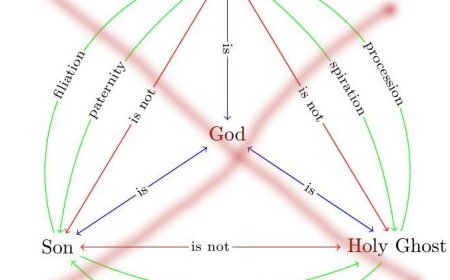Born Again Believers Who Backslide into Perdition
Backsliding is an Old Testament word and concept and not mentioned in the New Testament, however, there is a state of mind mentioned in the New Testament similar to the backslidden state called perdition.

The word backslider describes a believer who has left off worshiping God and gone back into the world and to their old sins. Backsliding is an Old Testament word and concept and not mentioned in the New Testament, however, there is a state of mind mentioned in the New Testament similar to the backslidden state called perdition. It means ruin or loss, physical, spiritual, or eternal: damnable, destruction, die, perish, pernicious ways, waste.
The way a believer falls into a state of perdition is to lack faith in God, His plan, and or His promises and return to trusting in the world. Second Thessalonians 2:3 refer to Satan as the “son of perdition.” His job is to physically and spiritually destroy people’s lives and damn their souls to hell by planting doubt in their minds against God. He is not productive, but destructive, and his goal is to destroy the work of God, by destroying the faith of His believers.
Since Satan cannot permanently destroy the work of God or the true believers of Christ, one of his most successful strategies has been to build a false religion, operated by false preachers, teachers, and brethren. If he can create a large enough army of false Christians, he knows that it will be difficult for people to discern between the true and the false Christians, which will confuse their faith. His army of false Christians imitates the true in every area of the gospel, from the act of salvation to the look of successful Christianity, and to the imposturous apostles on the pulpit who teach his false doctrine. They quote scriptures of the Bible better than true Christians do.
They cast out devils, pretentiously heal the sick, speak in tongues (though not talking to God), and preach inspiring sermons drawing huge crowds worldwide. Yet, they lack the essentials needed to accomplish these feats righteously, which is love and truth. When Christians lack love and truth then there is no actual support for their faith. Faith needs love to operate effectively. “. . . faith which worketh by love” (Gal. 5:6). If faith needs love to operate and it takes faith to move mountains, or perform any work for God, then anyone who acts on the powers of God by faith must have love in their heart and as a motive.
Moreover, “So then faith cometh by hearing, and hearing by the word of God” (Ro. 10:17), so people must believe in the Word of God and trust in the promises of the Bible. They must believe, without doubting, that what He says in the Bible is true and will happen according to His promises. When the believer doubts and strays from the promises of the Word, then they will lack faith since faith comes from the Word. Once this lack of faith overtakes a believer they fall into a state of perdition.
Hebrews, the book of faith, in chapter 10:38, 39 it says, “Now the just shall live by faith: but if any man draw back, my soul shall have no pleasure in him. But we are not of them who draw back unto perdition; but of them that believe to the saving of the soul.” Perdition eventually leads to spiritual death and the soul waste away. Many will swear on their souls that they trust God and the Word yet they really do not. The devil will swear and confess also, but will never trust God, nor the Word and that is why he is the son of perdition.
There was a woman who had no job, three children and a house payment due. Her husband had left her the month before. They separated because he felt she had gone too far in practicing the Bible and it was straining their marriage, and he gave her an ultimatum, either him or God. The way he forced her hand was, he left her with the unpaid house note and three hungry children. He figured she would eventually give in and abandon her faith in God. The woman talked with a friend who told her to get the money somewhere else, like a church, or a family member.
The woman did not go to the church and ask because she was ashamed before the other saints and she did not want to ask her father for the money, although she knew he had it, because she did not want her father to see her in that condition. Her love for God was being tested because the Bible says “But my God shall supply all your need according to his riches in glory by Christ Jesus” (Phil. 4:19). Many believers embrace this scripture and recite it often to others in tight situations, as the one above.
Believers who lack faith and who doubt would probably fold under such pressure; nevertheless, what should a believer in such a situation do? Trust God, or man? The woman allowed the husband to return and afterward she fell into a state of perdition because she lacked faith in God. Her foolish pride forbad her to go to someone else for help and she would have never known what would have happened if she had. The husband defeated her faith and a month later, the woman ended up leaving the home and the kids also.
Another example is of a pastor who fell into perdition for the sake of money. This pastor led a small church of about fifty Spirit-filled believers. The church was spiritually strong and sound in faith and in the doctrine of Christ. One weekend, the pastor attended a conference with the other pastors in the organization. The topic of the conference was how the organization planned to extend the work of the ministry by building more churches throughout the country.
The head Bishop suggested that each pastor help in this campaign by raising more money in their churches and contributing more to the fund of the organization. He preached an inspiring sermon based on building God’s way and the conference ended. Half of the pastors exited the meeting room excited and the other half suspicious of the technique the Bishop suggested and felt that raising more money in their churches could interfere with the spiritual growth.
The next Sunday the pastor of the small congregation announced his plans from the pulpit. He was one of the pastors who accepted the idea and would put it into effect at his church. He told the congregation they needed to raise three hundred thousand dollars over the next three years. As a natural reaction, some of the congregation was shocked and the other half was delighted, as it was at the conference. In the next three months, the church changed dramatically. It began to lose its spiritual strength and started building in the physical, as in the church treasury.
They started fund-raising, having carnivals for the children, special women’s services and men’s programs, they cooked church dinners and charged by the plate inviting different churches to participate, and over those three months, the church lost four members. The other members persecuted some away from the church for not taking part in the money raising schemes. The pastor’s sermons changed from uplifting and inspiring to how to sow and reap the promises of God. He placed greater emphasis on tithes, offerings, and giving. He started different church funds such as the building fund, the women’s fund, the children’s fund, and other unnecessary funds.
Soon, the church had only half the members it started with and those who remained were all in a state of perdition along with the pastor. The love of God the saints once possessed vanished, and the love of money took root. The point is, after a believer loses faith in the promises and concepts of God, and begins depending on the physical world, they fall into perdition. The way to stay in right standing with God and not fall is to believe and trust in
His Word even if the situation seems impossible. Moses, when he confessed to being a Hebrew notwithstanding the possibility of his execution by the Egyptians shows great faith and trust in God’s promise. And when, on a word from God, Moses convinced the children of Israel that God awaited them at the mountain of Sinai, they followed him through the wilderness on faith. Other examples in Hebrews chapter 11 teach on the faith other believer’s has had in God.
It takes faith to leave all and go onto an uncertain destiny, as the disciples did for Jesus. His words were enough to believe in even though they had never experienced the presence of God. God promises many rewards to believers for their acts of faith; but the believer must believe in and stand on the promises of God if they are to walk with God.
The longer the believer walks with God, the better chance of their perfection in the gospel. False doctrine, lack of sanctification, lack of truth, idolatry, and lusts are some things that will cause believers to fall back into the ways of the world. However, many times it is not the fault of the believer, but of the believer’s pastor. “For the leaders of this people cause them to err; and they that are led of them are destroyed” (Isa. 9:16).
Pastors are responsible for the direction of the flocks. They should know the ways of the Lord and how to keep the flock from falling into perdition or from lacking faith. People should trust pastors to an extent but should also study for themselves, or they will never know when or if the pastor will stray, as the one in the example above. Total trust must be in God and in His Word, and not wholly in man, nevertheless, God gave the church pastors to lead and guide them on the road to the kingdom.
Most pastors begin with good intentions and on the right road but they are never exempt from deception. Some pastors go astray and the Lord gives them a chance to return, and many do, but some do not. If the believer knows the Word and will of God, they will realize when the pastor goes astray, and maybe they can help in restoring that pastor.
Unfortunately, people do not take their own salvations into their hands; they depend wholly on the pastor’s words and directions. This is why there are millions of souls doomed for hell now, because they trust more in the pastor than in God. Many of today’s pastors trust in the trends of the world and the prosperity of the country and they have long forsaken the true essence of the gospel. In their attempt to fill the seats in these new mega-churches, pastors compromise the true ways of the gospel. When teaching salvation, they use brief credos and confessions of faith and those who sincerely seek the road to eternal life never find the way.














































